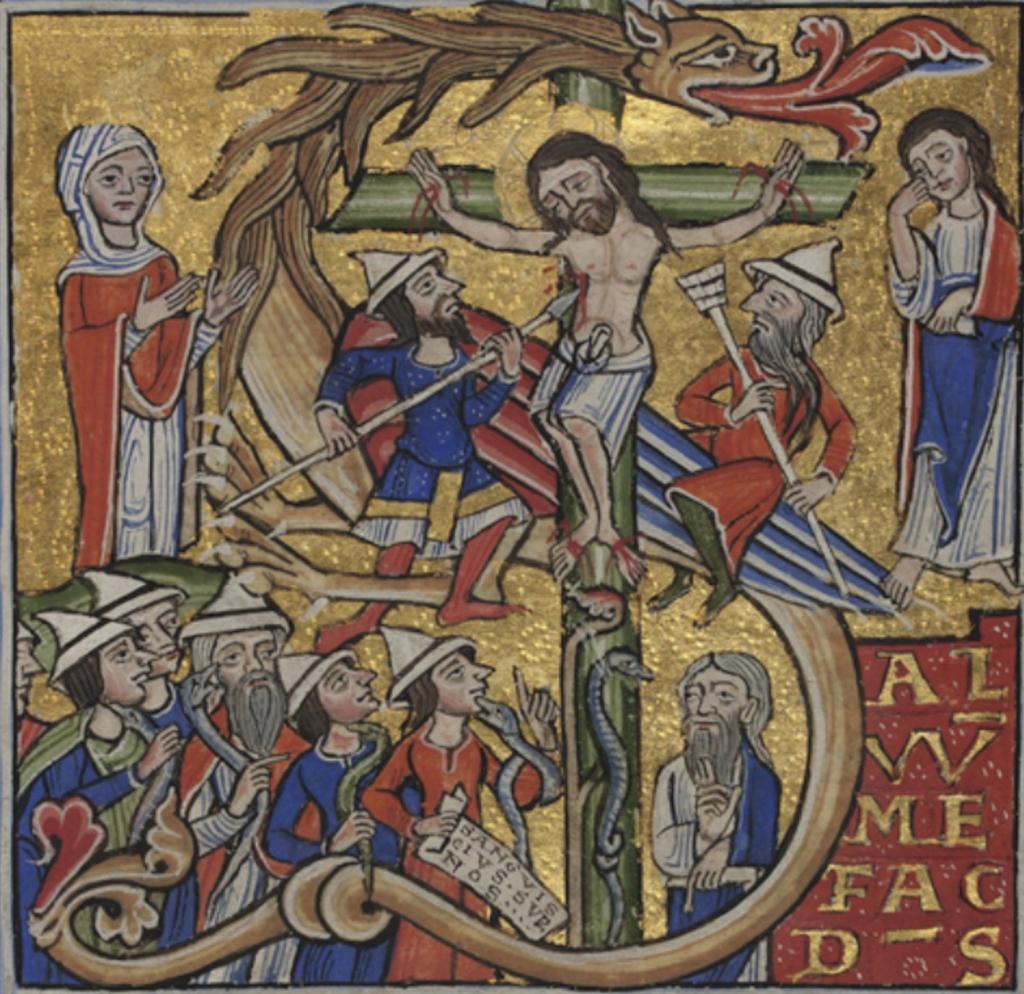J. Christopher Edwards has a new book out this week entitled Crucified: The Christian Invention of the Jewish Executioners of Jesus (Fortress Press). He has kindly agreed to present a guest post on that theme.
Here is the publisher’s description of the book:
Historians of early Christianity unanimously agree that Jesus was executed by Roman soldiers. This consensus extends to members of the general population who have seen a Jesus movie or an Easter play and remember Roman soldiers hammering the nails. However, for early Christians, the detail that Jesus was crucified by Roman soldiers under the direction of a Roman governor threatened their desire for a stable existence in the Roman world. Beginning with the writings found in the New Testament, early Christians sought to rewrite their history and shift the blame for Jesus’s crucifixion away from Pilate and his soldiers and onto Jews. During the second century, a narrative of the crucifixion with Jewish executioners predominated. During the fourth century, this narrative functioned to encourage anti-Judaism within the newly established Christian empire. Yet, in the modern world, there exists a significant degree of ignorance regarding the pervasiveness–or sometimes even the existence!–of the claim among ancient Christians that Jesus was executed by Jews. This ignorance is deeply problematic, because it leaves a gaping hole in our understanding of what for so long was the direct underpinning of Christian persecution of Jews. Moreover, it excuses from blame the venerated ancient Christian authors who constructed and perpetuated the claim that the Jews executed Jesus. And on an unconscious level, it may still influence Christians’ understanding of Jews and Judaism.
Paula Frederiksen offers high praise of the book, calling it “a haunting story, compellingly told.”
Following that prelude, let me now pass over to Dr. Edwards himself:
The Forgotten Christian Accusation that the Jews Executed Jesus
J. Christopher Edwards
Imagine you are present during the execution of Jesus of Nazareth 2000 years ago. What do you see? A man being suspended upon a wooden cross? Who is suspending him? What is their appearance? Take a moment to envision it.
Almost anyone who has ever seen a Jesus movie, an Easter play, or any other modern portrayal of Jesus’ crucifixion will envision a man being fixed to a beam by Roman soldiers, that is, men donning a metal helmet with a red crest, and perhaps also a red cape. This portrayal matches the well-founded scholarly consensus about what actually happened to Jesus of Nazareth, that he was indeed crucified by Roman soldiers. It also matches our earliest two narrations of Jesus’ crucifixion in the New Testament Gospels of Mark and Matthew, each of which depicts Jesus’ execution at the hands of Roman soldiers under the direction of Pontius Pilate.
This original narration of Jesus being crucified by Roman soldiers under the direction of a Roman governor quickly fell out of favor among Christians who desired to evangelize and settle within the Roman world. After all, it could not have been advantageous to be a follower of someone executed for political crimes against the Roman state! In the final decades of the first century, these Christians began to adjust their memories of Jesus’ crucifixion so that he was executed, not by Roman soldiers, but by Jews. The third narration of Jesus’ execution in the New Testament—the Gospel of Luke—is the first to make this claim. Following Luke’s lead, second- and third-century retellings of the crucifixion almost uniformly depict Jews as Jesus’ executioners. In fact, we can reasonably assert that a narration of Jesus’ execution at the hands of Jews became standard across the Roman Empire within 100-150 years of Jesus’ death.
Most ancient Christians who accused the Jews of killing Jesus were not interested in blaming a handful of malevolent Jews of executing Jesus in Jerusalem around the year 30 CE. Rather, they were interested in blaming the execution on Jews of all ages. They understood Jesus’s Jewish executioners to be unified with the monolithic wave of Jews who opposed the prophets, Jesus, and whatever activities existed in their Christian communities. This assumption of Jewish continuity across the ages has enabled Christians across two millennia to assert that the unbelieving Jews they know are one with those who killed Jesus and the prophets. Even more troubling is that in their quest to imitate the sufferings of Christ, Christians have sometimes assumed that, like Jesus, their own troubles must be ultimately caused by Jews, the same Jews responsible for the death of Christ. In fact, it was not until 1965, during the Second Vatican Council, that the Roman Catholic Church finally renounced this assumption of the timeless Jew in Nostra Aetate.
In the modern world, both inside and outside the church and academia, there exists a significant degree of ignorance regarding the pervasiveness—or sometimes even the existence!—of the claim among earlier generations of Christians that Jesus was executed by Jews, and that Jews of all generations bear the guilt for this crime. This ignorance is deeply problematic, because it leaves a gaping hole in our understanding of what for so long was the direct underpinning of Christian persecution of Jews. Moreover, it excuses from blame the venerated ancient Christian authors who constructed and perpetuated the claim that the Jews executed Jesus.
The demonstrable fact that the shifting identification of Jesus’s executioners from Roman soldiers to Jews first occurs within the Scriptures is a difficult pill to swallow for Christians, including myself, who frequently view these texts as the uniquely inspired Word of God. Not only does it mean that the Scriptures affirm something that is historically inaccurate, but it also means that the Scriptures serve as the foundation for the centuries of Jewish persecutions that were grounded in that inaccuracy. Of course, Jesus’s execution by Jews is not the only unfortunate detail affirmed in the Scriptures. Rather, it is simply another item that can be added to the list of more well-known difficulties, such as scriptural texts about violence, women, homosexuality, and slavery. For these issues, we Christians who treasure our texts but are committed to justice will have to conclude that they are simply wrong at times. The only alternative would be to assert that, for example, in certain circumstances in the distant past, God said it was permissible for one person to own another. Assuming this is unacceptable, we must conclude that some scriptural texts, which present God conversing with humans about rules concerning slavery, are fundamentally wrong. It may be more difficult to extend such a critical eye toward Scriptures at the heart of the passion narrative, but the alternative of affirming that Jesus was executed by Jewish actors is, again, unacceptable.
Honest conversations about some of the shortcomings in our Scriptures and the history generated by those shortcomings are always welcome. Acknowledging one’s sacred errors serves as a sign of religious maturity. Every religion has traditions to be sorry about, and lamenting those traditions is good religious practice. Of course, it almost goes without saying that there are many wonderful teachings in Christian scripture about how to live a life of contentment, peace, hope, and love. There are also many treasured Christian teachings about Jesus’s divinity, humanity, and resurrection from the dead. None of these are threatened by humble and repentant self-criticism, whereby we repudiate the urge to defend the historical and moral errors within the Scriptures, especially the accusation that unbelieving Jews crucified Jesus. This accusation is not a minor footnote in Jewish history. Rather, it is a source of tremendous grief that Christians cannot ignore.
The accusation that Jews executed Jesus is today perhaps the most overlooked of all Christianity’s sacred errors. For Christians, acknowledging its existence means that we cannot make excuses for our canonical texts or our venerated saints when they display their human propensities toward demonizing the other. We must recognize how enshrining the accusation within our sacred traditions assured its influence on generations of Christians who shamed and persecuted Jews as murderers of the Lord. We must discover how to lament the human failings within our religious traditions while simultaneously remaining committed to them as paths of life and peace. Learning to criticize and lament some aspects of one’s tradition while clinging to others as words from God is the journey of a lifetime. It is what I believe makes religion so intensely interesting, infuriating, personally challenging, and ultimately fulfilling.














